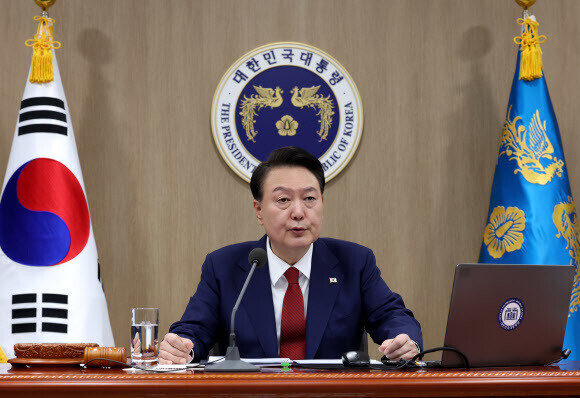hankyoreh
Links to other country sites 다른 나라 사이트 링크
[Editorial] Suspending inter-Korean military agreement would be a dangerous mistake

The South Korean government has already declared its intention of scrapping the 2018 comprehensive military agreement with North Korea, and now it’s moving forward toward that goal. Officials say they’re looking into ways to suspend the inter-Korean military pact if North Korea moves ahead with a third attempt to place a military spy satellite into orbit.
“If North Korea succeeds in launching a military reconnaissance satellite, it would signify that North Korea’s ICBM (intercontinental ballistic missile) capabilities have been taken to a higher level. Therefore, we will have to come up with reinforced countermeasures,” South Korean President Yoon Suk-yeol told the Associated Press in written comments published Tuesday.
“Several issues with the Sept. 19 military agreement have been raised, including the fact that it severely restricts our military’s defensive posture in respect to military exercises and reconnaissance of North Korea. We will be reviewing all necessary measures while monitoring North Korea’s actions,” an official from the Ministry of Unification told Korean reporters Tuesday.
Key officials in the Yoon administration have previously promised to suspend or scrap the Moon Jae-in-era accord, which they say restricts South Korea’s ability to conduct surveillance and reconnaissance in North Korea. Now they seem to be putting those words into action.
South Korean Defense Minister Shin Won-sik stressed the need to suspend the Sept. 19 agreement while speaking to US Secretary of Defense Lloyd Austin in the two countries’ Security Consultative Meeting on Monday.
Shin is determined to scrap the pact, which he says disadvantages South Korea because the no-fly zone it imposes severely restricts the surveillance and reconnaissance activities of South Korean and American air reconnaissance assets, which are superior to those of North Korea.
Following Hamas’ attack on Israel last month, the South Korean government and the ruling People Power Party (PPP) have promised to suspend the 2018 agreement as soon as possible because of what they describe as its severe restrictions on real-time surveillance of indications of an imminent North Korean provocation around the front lines.
Formally known as the “Agreement on the Implementation of the Historic Panmunjom Declaration in the Military Domain,” the inter-Korean military agreement was concluded during an inter-Korean summit on Sept. 19, 2018, and sets up a buffer zone around the Military Demarcation Line on the ground, in the sea and in the air with the goal of preventing unintended military clashes.
Since the agreement was signed, there have been violations of its regulations, inter-Korean relations have worsened, and tensions have risen. But the fact remains that Korea hasn’t seen the armed clashes, or the resulting casualties, that it saw before the agreement took effect. We also need to consider that the goal of arms control is to prevent clashes and war by placing restrictions on certain military activities.
Suspending the Sept. 19 inter-Korean military agreement would increase the risk of armed clashes and war on the Korean Peninsula. Does that really serve our national security?
There are major concerns that the ruling party’s politically motivated attempt to rally the base by erasing the achievements of the previous administration is a risky scheme that will only raise tensions.
We hope the government will recognize that as inter-Korean relations worsen and as geopolitics grow more precarious, given the ongoing wars in Ukraine and the Gaza Strip, there’s an even greater need for safety precautions that can prevent unintended clashes.
Please direct questions or comments to [english@hani.co.kr]

Editorial・opinion
![[Column] Is Korean democracy really regressing? [Column] Is Korean democracy really regressing?](https://flexible.img.hani.co.kr/flexible/normal/500/300/imgdb/original/2024/0705/2917201664129137.jpg) [Column] Is Korean democracy really regressing?
[Column] Is Korean democracy really regressing?![[Column] How tragedy pervades weak links in Korean labor [Column] How tragedy pervades weak links in Korean labor](https://flexible.img.hani.co.kr/flexible/normal/500/300/imgdb/original/2024/0703/8717199957128458.jpg) [Column] How tragedy pervades weak links in Korean labor
[Column] How tragedy pervades weak links in Korean labor- [Column] How opposing war became a far-right policy
- [Editorial] Korea needs to adjust diplomatic course in preparation for a Trump comeback
- [Editorial] Silence won’t save Yoon
- [Column] The miscalculations that started the Korean War mustn’t be repeated
- [Correspondent’s column] China-Europe relations tested once more by EV war
- [Correspondent’s column] Who really created the new ‘axis of evil’?
- [Editorial] Exploiting foreign domestic workers won’t solve Korea’s birth rate problem
- [Column] Kim and Putin’s new world order
Most viewed articles
- 1[Column] Is Korean democracy really regressing?
- 2Real-life heroes of “A Taxi Driver” pass away without having reunited
- 3Former bodyguard’s dark tale of marriage to Samsung royalty
- 4What will a super-weak yen mean for the Korean economy?
- 5Health care experts call on government to address problems with end of life legislation
- 6Koreans are getting taller, but half of Korean men are now considered obese
- 7Over 200,000 Koreans sign petition calling for deportation of Yemeni refugees in Jeju
- 8BBC documentary’s new revelations about Burning Sun scandal reignite rage, grief in Korea
- 910 days of torture: Korean mental patient’s restraints only removed after death
- 10[Interview] The untold story behind South Korea’s national anthem